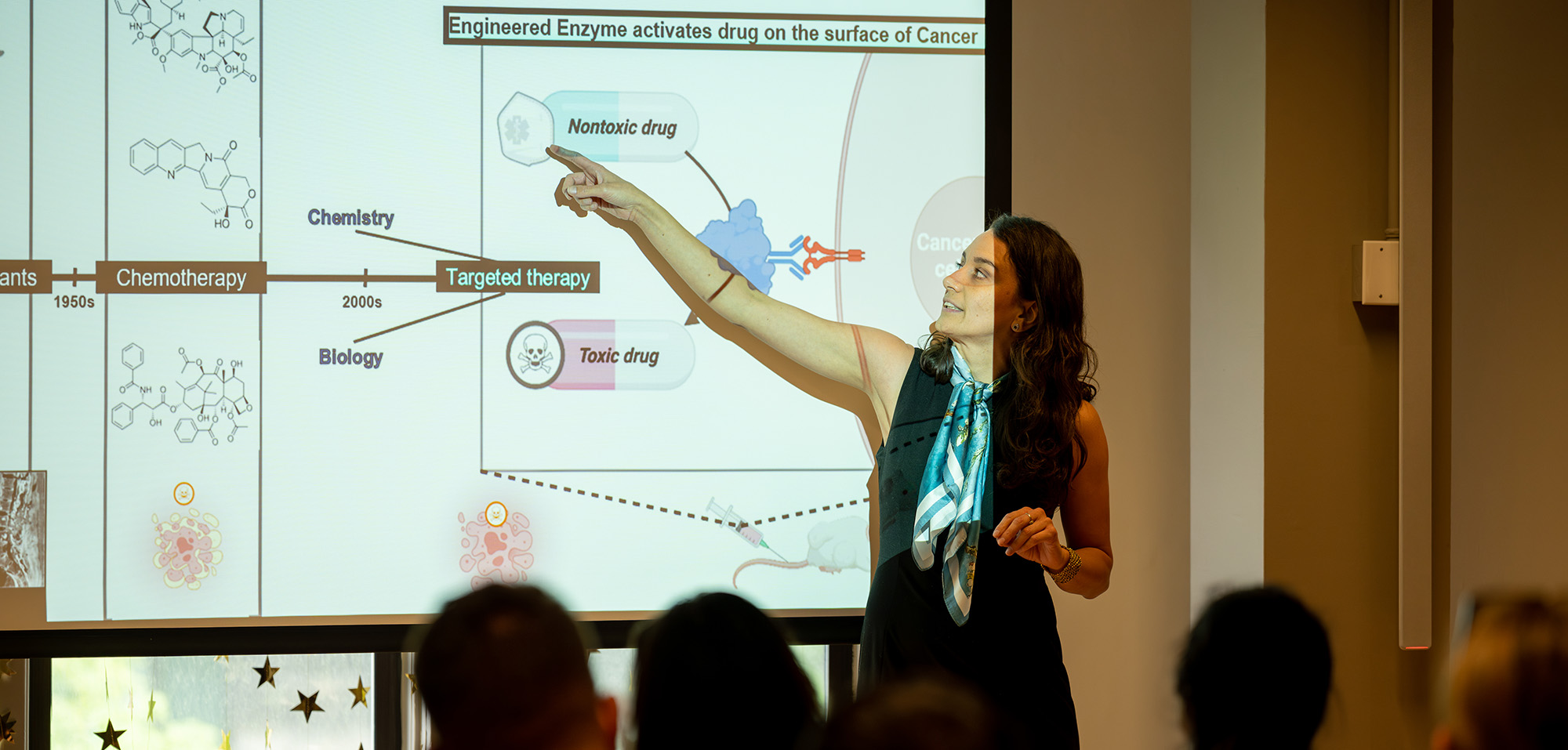
Doctoral students sum up years of work in 180 seconds.
It all started with a drought in Australia.
To conserve water, residents of Queensland were encouraged to time their showers; many used a three-minute egg timer for this unhappy purpose. One day the dean of the University of Queensland’s graduate school had a brain wave: Could doctoral candidates summarize their research under the same time constraint?
The first 3MT—Three Minute Thesis—competition was held at the University of Queensland in 2008 with 160 competitors. Since then it has spread to more than 900 universities in over 85 countries. 3MT came to UChicago in 2018, organized by UChicagoGRAD, a career advising and support service for graduate students and postdocs. For the second year in a row, alumni were invited to watch.
It’s midday on May 19, the Friday of Alumni Weekend. Nearly every chair in UChicagoGRAD’s headquarters—on the third floor of the campus bookstore building—is taken.
At the podium, Kathrin Kranz, director of experiential learning and outreach at UChicagoGRAD, explains the rules: in addition to the three-minute time limit, speakers may use just a single slide. A surprised “ohhhh” arises from the audience.
Off to the side is the table of judges: Brooke Carrell, assistant provost and executive director of UChicagoGRAD; Vera Dragisich, PhD’90, senior instructional professor of chemistry; and Ella Karev, AM’18, PhD’22, postdoctoral teaching fellow in the humanities. Karev, an Egyptologist, won the 2022 competition with the presentation “Slavery in Ancient Egypt, c. 900 to 300 BC.”
Karev explains later by email: “Trying to condense my (600 page!) dissertation into one slide and three minutes forced me to think about not just the bigger picture but the biggest picture—why does this research matter to someone who isn’t an ancient historian?” As a second-year graduate student, she was advised to consider “translatability” when choosing a thesis topic: “I went with something that interested me, filled a gap in scholarship, and yes, was interesting to non-Egyptologists.”
First up is Giorgio Sarro (geophysical sciences) with the presentation “Will Climate Change Bring More Extreme Weather Events?” (The answer, at the bottom of his slide: “Yes.”) Dressed in a plaid shirt, plaid pants, and sneakers, Sarro speaks calmly, with big hand gestures and no notes.
The second presenter, Kelly Holob, AM’16 (Divinity School), is equally calm and polished (competitors attended a preparatory workshop and had one-on-one advising appointments, Kranz explains later). The slide for her talk, on “saints and other criminals” executed in antiquity, displays a rather distressing medieval painting. The bodies of the two thieves crucified next to Jesus are twisted and broken; one even has missing limbs. In contrast, Jesus’s body is “rational and beautiful.” This convention persists even today, she concludes: the media chooses menacing images of “justly” executed criminals, while people killed “unjustly” might be shown in a graduation photo.
Jelena Momirov (chemical biology), in a black sleeveless dress and a turquoise scarf, would win the best-dressed award if there were one. “The Golden Era of Cancer Research,” reads the title of her slide. Her presentation focuses on the development of targeted therapies. “I added the drug, cells were alive,” she says, describing her research on cancer cells. “I added the drug with the enzyme, cells died.” Her simple language and matter-of-fact delivery get a laugh out of a few audience members and one of the judges.
Over the next 30 years, Alzheimer’s deaths are projected to triple, says Nick Bayhi (biophysical sciences), a bearded man with long curly hair. “Thankfully, there’s an enzyme in your blood, that’s Pac-Man-shaped, called insulin-degrading enzyme or IDE.” He kindly offers to inject us all. “It would digest any amyloid beta in your brain, none of you would get Alzheimer’s disease, and I would get to graduate early.” Unfortunately, there’s a catch: “I would give you all uncurable diabetes and put you in a coma.” His work focuses on developing a mutated version of the enzyme.
Next up is “Lighter and Stronger?” by Adarsh Suresh (molecular engineering). Many industries—construction, packaging, automotive—want to cut the weight of their products without sacrificing performance. “We want lighter airplane parts,” Suresh says, “but we don’t want to plummet to our deaths.” Could a material be as light as Styrofoam but as strong as metal? Yes: “Nature has been doing it for millennia,” he says, showing a slide with photos of a honeycomb and a hollow bone.
In all there are 13 presentations on wildly diverse topics. Isabella Scott, SM’18, SM’20, and Pallav Goyal, SM’19, PhD’23, each gamely attempt to explain their mathematics research. Rachel Chery, AM’21 (music), speaks on the political importance of radios in Haiti: “Radios give us hope that democracy can prevail, one broadcast at a time.”
The final presentation: “Uncovering How Planets Formed.” Our solar system is full of dissimilar planets, says Adina Feinstein, SM’19, PhD’23 (astronomy and astrophysics); she’s wearing slim jeans with blown-out knees and Vans. “Earth does not look anything like Jupiter. And Jupiter doesn’t look anything like Uranus or Neptune. But all of these planets formed from the same material around the same star.” For her thesis research, Feinstein “had the absolute privilege” of using “NASA’s new $10 billion space telescope, the James Webb Space Telescope” to study exoplanet WASP–39 b. Exoplanets might have formed like our own planets, or maybe completely differently: “I would be very grateful for that option because it means long-term job security,” she concludes.
The judges confer as the audience loads up on wine, cheese, and other appetizers. Fifteen minutes later, the winners are announced: it’s a science sweep. Suresh wins first prize ($1,000) for light, strong materials. Bayhi wins second ($500) for the Pac-Man Alzheimer’s enzyme. Momirov comes in third ($200) for targeted cancer therapies.
Now it’s the audience’s turn to vote for their favorite on their phones. Keeping the science sweep going, Feinstein wins. Her first step toward exoplanet job security: a prize of $150.
